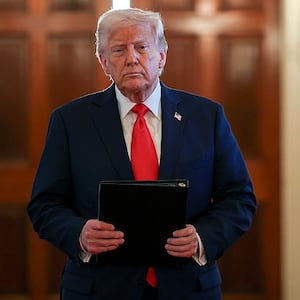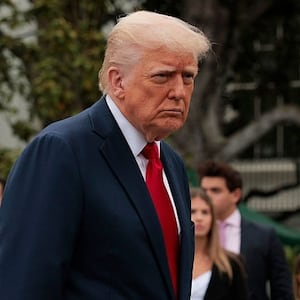The Trump administration will strip Harvard University of its tax-exempt status, the president announced on social media.
“We are going to be taking away Harvard’s Tax Exempt Status,” President Donald Trump wrote in a post on Truth Social early Friday. “It’s what they deserve!”
For weeks, the president has been warring with the nation’s oldest university. On April 11, the administration sent Harvard a five-page letter demanding a complete overhaul of the university’s governance, hiring practices, admissions, teaching, and research programs.
It said Harvard needed to hire an “external party” approved by the U.S. government to “audit” the students and faculty for viewpoint diversity. Any department or field lacking the acceptable level of “diversity” would have to either hire new faculty or be abolished altogether.
Harvard shot down the demands less than 72 hours later.
The administration said the changes were needed to combat antisemitism on campus, but the requirements were so onerous that even The Wall Street Journal‘s conservative editorial board slammed the move as “unprecedented” and said Trump’s demands “exceed his power under the Constitution.”

The Trump administration then retaliated against Harvard’s defiance by freezing more than $2.2 billion in federal funding, targeting the university’s international students, and threatening to strip Harvard of its tax-exempt status.
On April 15, the president wrote in a Truth Social post, “Perhaps Harvard should lose its Tax Exempt Status and be Taxed as a Political Entity if it keeps pushing political, ideological, and terrorist inspired/supporting ‘Sickness?’ Remember, Tax Exempt Status is totally contingent on acting in the PUBLIC INTEREST!”
A day later, several news outlets—including CNN and Fox News—reported the Internal Revenue Service was making plans to rescind Harvard University‘s tax-exempt status at the Trump administration’s behest.
Trump’s latest Truth Social post seemed to confirm those reports and raised some potentially thorny legal questions for the administration.

Soon after the president’s original April 15 threat, the White House told CBS News the IRS was acting independently of Trump.
Congress passed a law in 1998 that prohibits the president from directing the IRS to audit or investigate taxpayers, legal experts told the news outlet. If Trump told the IRS to remove Harvard’s tax-exempt status, “that runs exactly contrary to the law,” a professor at Loyola University Chicago School of Law told CBS.
The White House responded with a statement saying, “Any forthcoming actions by the IRS will be conducted independently of the President, and investigations into any institution’s violations of its tax status were initiated prior” to Trump’s April 15 post.
Now, however, Trump has announced that “we” are taking away the tax-exempt status. He didn’t say under what grounds the IRS would remove the designation.
Organizations whose purposes are “charitable, religious, educational, scientific, literary, testing for public safety, fostering national or international amateur sports competition and the prevention of cruelty to children or animals” can qualify for tax-exempt status, according to the IRS.
The IRS would have to inform Harvard of its reasons for removing the tax-exempt status, according to CBS, and the university would be able to appeal the agency’s finding. If that failed, the university could sue the IRS.
Last month, Harvard sued to try to stop the government from freezing its funding, saying the move violated its First Amendment rights.
“No government—regardless of which party is in power—should dictate what private universities can teach, whom they can admit and hire, and which areas of study and inquiry they can pursue,” the suit said, quoting university President Alan Garber.
President Alan Garber, who is Jewish, said in an April 23 interview with NBC News that the university did indeed have a problem with antisemitism, which it takes “very seriously.” But that has nothing to do with the administration’s efforts to strip the university of its funding, he added.
“We are defending what I believe is one of the most important lynchpins of the American economy and way of life: our universities,” Garber said. “We cannot compromise on basic principles like defense of our First Amendment rights.”








